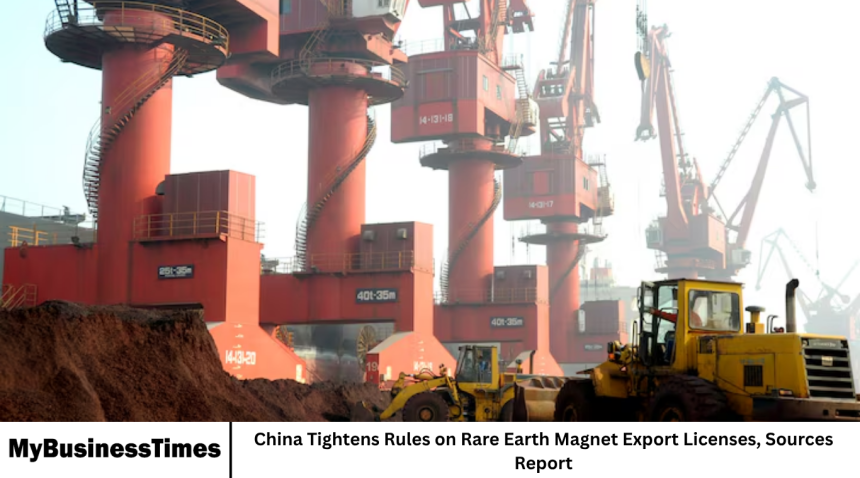China is reportedly tightening its rules on rare earth magnet export licenses, raising global concerns about the availability of these vital materials for technology, renewable energy, and defense industries.
- China’s Dominance in Rare Earth Materials
- Stricter Export License Regulations
- Impact on Global Industries
- Strategic Importance of Rare Earths
- Reactions from the Global Community
- Economic and Political Implications
- Effects on Businesses and Supply Chains
- Environmental Concerns and Sustainable Alternatives
- China’s Long-Term Strategy
- Global Market Reactions
- Outlook for the Future
- Frequently Asked Questions
- Conclusion
Rare earth magnets are essential components in electric vehicles, wind turbines, smartphones, and advanced military equipment. This move comes amid growing geopolitical tension and efforts by many nations to reduce dependence on Chinese supplies.
China’s Dominance in Rare Earth Materials
China has long been the world’s largest producer and exporter of rare earth elements, controlling more than 70 percent of global production. These materials, including neodymium, dysprosium, and terbium, are critical for producing powerful permanent magnets used in high-tech applications. Beijing’s dominance gives it significant leverage over the global supply chain, which has become a strategic tool in international trade and diplomacy.
Stricter Export License Regulations
According to sources familiar with the situation, Chinese authorities have introduced new rules that make it harder for companies to obtain export licenses for rare earth magnets. The process now involves additional scrutiny, longer approval times, and stricter requirements for documentation. Exporters are required to provide detailed information about the end use of the materials, as well as proof that they will not be used in military or sensitive technologies.
This development follows earlier restrictions China placed on exporting gallium and germanium, two elements used in semiconductors. Analysts believe the new export control measures signal China’s intent to tighten oversight on critical materials amid rising global competition and trade disputes.
Impact on Global Industries
The tightening of rare earth export licenses is expected to impact industries worldwide. Countries such as Japan, South Korea, the United States, and members of the European Union rely heavily on Chinese rare earth supplies for manufacturing advanced technology products.
Electric vehicle manufacturers, in particular, may face delays and increased costs due to limited access to neodymium and dysprosium magnets used in EV motors. Renewable energy companies that rely on wind turbine magnets may also face disruptions, potentially slowing the growth of green energy projects.
Strategic Importance of Rare Earths
Rare earth materials have become a crucial component of the global economy, linking technology, defense, and energy industries. Beyond civilian use, these materials are vital for producing guidance systems, jet engines, and other defense equipment. Any disruption in supply can therefore have far-reaching implications, not only for commercial industries but also for national security.
China’s decision to strengthen control over exports comes at a time when the world is increasingly focused on securing resilient and independent supply chains. Nations such as the United States, Australia, and Canada are ramping up investments in mining and processing facilities to reduce reliance on Chinese rare earths.
Reactions from the Global Community
Governments and industry leaders around the world have expressed concern over China’s move. The United States has called for diversification of supply sources and increased domestic production to ensure security of supply. Japan, one of the biggest importers of Chinese rare earths, is exploring partnerships with Southeast Asian nations to secure alternative sources.
The European Union has also launched initiatives to build a self-sufficient critical minerals supply chain, with the Critical Raw Materials Act aiming to reduce dependency on foreign sources. However, experts warn that it may take years before alternative suppliers can match China’s scale and efficiency.
Economic and Political Implications
China’s new export restrictions may also serve as a political message to countries that have imposed trade or technology bans against it. By tightening control over materials essential to the global economy, Beijing could be signaling its willingness to use economic leverage in response to Western actions.
The move adds another layer of complexity to already strained U.S.-China relations, particularly in the context of advanced technology and defense-related exports. Some analysts believe this could accelerate global efforts to build parallel supply chains, further dividing global trade into competing blocs.
Effects on Businesses and Supply Chains
Businesses dependent on rare earth magnets will likely face rising costs and supply uncertainties. Many manufacturers are now seeking ways to recycle rare earth materials or develop substitutes to mitigate risk. However, the process of establishing recycling systems or new mining operations can take several years, leaving industries vulnerable in the short term.
Supply chain managers are expected to reassess procurement strategies, diversify suppliers, and stockpile materials where possible. Companies in sectors such as automotive, electronics, and renewable energy are already exploring new partnerships and technological alternatives to reduce reliance on Chinese rare earths.
Environmental Concerns and Sustainable Alternatives
The tightening of export licenses may also encourage more environmentally sustainable mining practices in other regions. Rare earth mining in China has long been associated with pollution and environmental degradation. As other countries begin to develop their own resources, there is a growing emphasis on cleaner and more responsible extraction methods.
Some research institutions and companies are also investing in technologies that can produce rare earth magnets with reduced environmental impact or even eliminate the need for certain elements altogether.
China’s Long-Term Strategy
China’s approach to rare earth export control appears to align with its broader strategy of maintaining control over key global supply chains. By limiting exports, Beijing can prioritize domestic industries that rely on these materials for high-value products like electric vehicles, renewable energy systems, and advanced electronics.
This strategy also ensures that China retains a competitive edge in emerging technologies while reducing the availability of critical materials to countries considered competitors.
Global Market Reactions
Markets have reacted cautiously to the news, with prices for rare earth materials rising due to concerns over limited supply. Investors are closely monitoring how the restrictions will affect production in key sectors, particularly electric vehicles and renewable energy.
Commodity analysts predict that rare earth prices will remain volatile as governments and companies adjust to the new regulatory environment. Increased demand for alternative sources could drive up investment in mining projects in countries such as Australia, the United States, and Africa.
Outlook for the Future
The long-term impact of China’s tighter export regulations will depend on how quickly other nations can build alternative supply chains. While the immediate effect is likely to be price increases and supply delays, the move could ultimately accelerate global efforts toward diversification and sustainability.
In the coming years, collaboration between governments, private companies, and research institutions will be essential to ensure a more stable and secure supply of rare earth materials. The world is moving toward cleaner energy and digital transformation, and access to these critical elements will play a defining role in shaping the next phase of industrial and technological progress.
Frequently Asked Questions
What are rare earth magnets?
Rare earth magnets are powerful permanent magnets made from rare earth elements like neodymium and dysprosium. They are widely used in electric vehicles, wind turbines, smartphones, and defense equipment.
Why is China restricting rare earth exports?
China is tightening export rules to strengthen control over strategic resources, ensure domestic supply for its industries, and potentially use these materials as leverage in international trade relations.
Which countries depend most on China for rare earth materials?
The United States, Japan, South Korea, and members of the European Union are among the largest importers of Chinese rare earth materials.
How will the restrictions affect global industries?
Industries such as electric vehicles, renewable energy, and consumer electronics may face supply delays, higher costs, and increased competition for limited materials.
Are there alternatives to Chinese rare earths?
Some countries are investing in new mining operations, recycling technologies, and material substitutes, but it will take time to reduce dependence on China’s dominant supply chain.
What is the long-term outlook for the rare earth market?
In the long run, tighter export controls may encourage global diversification, innovation, and more sustainable mining practices, reshaping the rare earth supply chain over the next decade.
Conclusion
China’s decision to tighten export rules for rare earth magnets marks a pivotal moment in the global technology and resource landscape. While it strengthens China’s position as a dominant supplier, it also highlights the vulnerabilities of global supply chains heavily dependent on a single source.
For countries and companies worldwide, this move is a reminder of the urgent need to diversify supply chains, invest in alternative technologies, and pursue sustainable production practices. As the race for control over critical materials intensifies, the balance between national security, economic strategy, and environmental responsibility will define the future of global trade and innovation.









